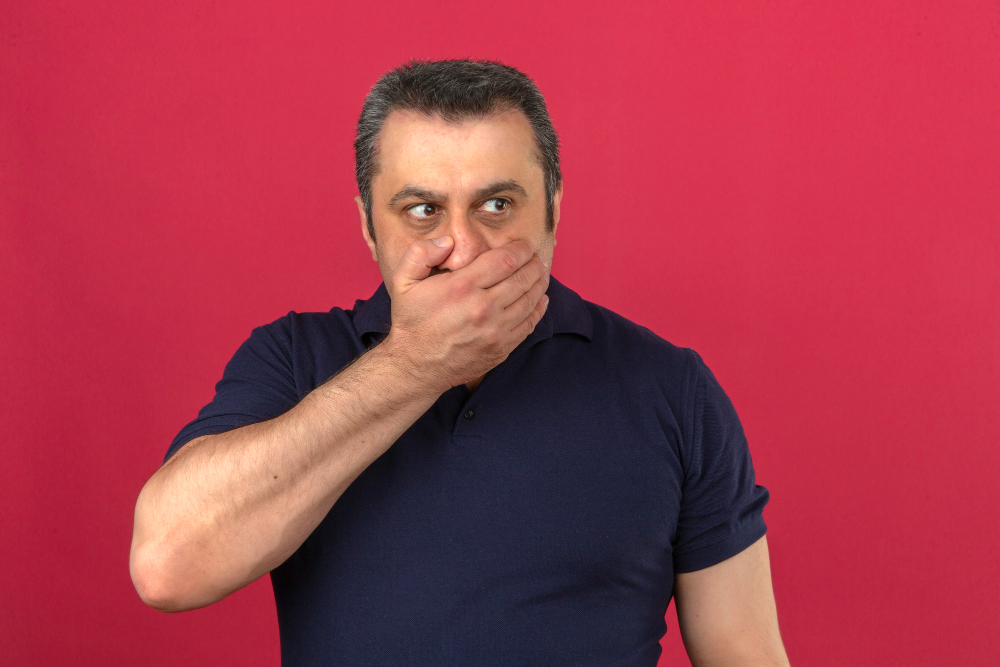Introduction: Understanding Mouth Smell Reason
What Causes Mouth Smell?
Mouth smell reason often results from poor oral hygiene. When food particles and bacteria stay in the mouth, they break down and release sulfur compounds. This causes bad breath. Brushing, flossing, and using mouthwash regularly can help prevent this.
Dry mouth, or xerostomia, is another common cause. Saliva helps neutralize acids and wash away food particles. Without enough saliva, bacteria grow, leading to bad breath. Dehydration, certain medications, or health issues like diabetes can cause dry mouth.
Gum disease and cavities also contribute to mouth smell. Bacteria in the gums or cavities create unpleasant odors. Regular dental visits and treatment can prevent this.
Diet plays a role too. Foods like garlic and onions release strong-smelling compounds. These linger on the breath. Low-carb and high-protein diets can also cause ketosis, leading to fruity-smelling breath.
Some medical conditions also cause bad breath. Diabetes, acid reflux, and respiratory infections can affect metabolism and digestion, leading to mouth smell. Addressing these conditions is key to managing bad breath.
Common Myths About Bad Breath
Many myths surround bad breath. One common myth is that mouthwash can solve the problem. Mouthwash may mask bad breath temporarily, but it doesn’t fix the root cause. Some mouthwashes with alcohol can worsen dry mouth, making things worse.
Another myth is that bad breath is always caused by food or poor hygiene. While these factors are common, bad breath can also signal health problems like diabetes or liver disease. If bad breath persists, it’s important to consult a healthcare provider.
Some think bad breath only affects people with dental issues. But even those with healthy teeth and gums can have bad breath. Medications, stress, and hormonal changes can also contribute. It’s important to understand that bad breath isn’t always linked to visible dental problems.
The Primary Mouth Smell Reasons

Poor Oral Hygiene
One of the leading mouth smell reasons is poor oral hygiene. When food particles and plaque remain in the mouth, bacteria feed on them, releasing sulfur compounds that cause bad breath. Regular brushing and flossing remove food debris and plaque from the teeth and gums, preventing the buildup of bacteria. Using mouthwash can also help temporarily mask odors, but it’s no substitute for maintaining a proper oral care routine. If left unchecked, poor hygiene can lead to more severe issues like gum disease, which only worsens the bad breath.
Dry Mouth (Xerostomia)
Dry mouth, or xerostomia, is another significant cause of mouth smell. Saliva is essential for neutralizing acids, washing away food particles, and controlling bacteria. When the mouth doesn’t produce enough saliva, bacteria can flourish, leading to unpleasant odors. Dry mouth can result from dehydration, medications, or conditions such as diabetes. It’s important to drink plenty of water throughout the day and use saliva substitutes if necessary. Chewing sugar-free gum can also help stimulate saliva production and combat mouth smell.
Gum Disease and Cavities
Gum disease and cavities are both major contributors to persistent bad breath. When bacteria accumulate in the gums or in cavities, they produce foul-smelling compounds. Gum disease, in particular, creates pockets where bacteria can thrive, leading to a noticeable odor. Treating gum disease through professional cleanings and improved oral care is crucial. If cavities are present, they should be treated by a dentist to prevent further bacterial buildup and mouth smell. In both cases, maintaining good oral hygiene is key to preventing these issues from leading to bad breath.
Medical Conditions Contributing to Mouth Smell
Certain medical conditions can contribute to bad breath, and identifying these is important for addressing mouth smell reasons effectively. For example, gastrointestinal problems like acid reflux can cause stomach acids to back up into the mouth, creating a sour or acidic odor. Other conditions such as diabetes, kidney disease, or respiratory infections can lead to mouth odor as well. Diabetes, for instance, can lead to fruity-smelling breath due to high blood sugar levels, while kidney disease can produce a fishy odor. It’s essential to consult a healthcare provider to manage these conditions if they are causing bad breath.
The Impact of Diet on Mouth Smell
What you eat can have a direct impact on mouth smell. Foods like garlic, onions, and spicy dishes release strong-smelling compounds that can linger in the mouth for hours after eating. Similarly, a high-protein or low-carb diet can cause the body to enter a state of ketosis, which leads to a fruity or acetone-like odor on the breath. Sugary foods can also promote bacterial growth in the mouth, contributing to bad breath. To maintain fresh breath, it’s important to drink water regularly, avoid overly pungent foods when possible, and eat a balanced diet rich in fiber, fruits, and vegetables.
How Mouth Smell Reason Affects Your Confidence and Health

Social and Psychological Impact
Mouth smell can have a significant social and psychological impact. Bad breath often leads to self-consciousness, making individuals feel embarrassed in social situations. People may avoid close conversations or feel anxious about their breath, which can negatively affect their interactions and relationships.
This psychological stress can sometimes even lead to a cycle where the person becomes hyper-aware of their breath, exacerbating the issue. In some cases, individuals may isolate themselves or avoid social settings altogether due to the fear of judgment or rejection. Addressing the root causes of mouth smell, such as poor oral hygiene or medical conditions, can help restore confidence and ease social anxiety.
Connection Between Mouth Smell and Overall Health
Mouth smell is not just a cosmetic issue; it can be a reflection of your overall health. Persistent bad breath often indicates that something is wrong, either in your mouth or with your body. Medical conditions like diabetes, gastrointestinal disorders, or liver and kidney diseases can cause bad breath, revealing underlying health problems that need attention.
For instance, diabetic ketoacidosis produces a fruity, acetone-like odor on the breath, signaling a serious imbalance in blood sugar levels. Acid reflux, on the other hand, can cause a sour or bitter taste and bad breath as stomach acids enter the mouth. The mouth is often the first place to notice changes in health, and addressing mouth smell reasons can sometimes help identify and treat broader health issues early. Regular dental checkups and overall health monitoring are essential for maintaining both fresh breath and overall well-being.
Effective Treatment Options for Mouth Smell

Maintaining Proper Oral Hygiene
Brushing your teeth twice a day removes food particles and plaque, preventing bacteria buildup that causes bad breath. Flossing daily helps clean between your teeth and stops bad breath. Don’t forget to brush your tongue, where bacteria can linger. An antibacterial mouthwash can help, but avoid those with alcohol, as they can dry out your mouth. Regular dental visits are essential to catch any issues like cavities or gum disease early, which can lead to bad breath.
Hydration and Its Role in Preventing Bad Breath
Drinking enough water keeps your mouth hydrated. Saliva is key for washing away food particles and neutralizing acids. Without enough saliva, bacteria thrive, leading to mouth smell. Drinking water throughout the day helps prevent dry mouth. Chewing sugar-free gum or sucking on sugar-free candies can also help stimulate saliva production and keep your breath fresh.
Medications and Treatments for Mouth Smell
Certain medications can cause dry mouth, leading to bad breath. Antihistamines, decongestants, and some antidepressants are common culprits. If medications are the cause, ask your doctor for alternatives. Medical conditions like diabetes or acid reflux can also lead to persistent bad breath. Treating the underlying condition can help improve your breath. If bad breath continues, visit your healthcare provider or dentist to find the cause and proper treatment.
Natural Remedies for Fresh Breath
Natural remedies can help freshen your breath. Chewing mint or parsley neutralizes odors. Green tea, rich in antioxidants, fights bacteria in your mouth. Apple cider vinegar balances mouth pH and removes bacteria. Mix a tablespoon of apple cider vinegar in water and swish it around. Crunchy vegetables like carrots or celery help scrub food particles and boost saliva. These remedies can manage mild bad breath, but they don’t replace good oral hygiene.
Preventing Mouth Smell: Tips for Long-Lasting Fresh Breath

Daily Habits for Fresh Breath
Developing daily habits is essential for maintaining fresh breath. Brush your teeth twice a day, using fluoride toothpaste to remove food particles and bacteria. Don’t forget to floss to remove debris between teeth where your toothbrush can’t reach. Brushing your tongue is also important, as it can trap bacteria and food particles that contribute to bad breath. Rinse with an alcohol-free mouthwash to kill bacteria and freshen your breath. Stay hydrated throughout the day to help maintain saliva flow, which naturally neutralizes bad breath. Additionally, chewing sugar-free gum can stimulate saliva production, helping to keep your mouth fresh.
Foods to Avoid for Better Breath
Certain foods can cause mouth smell. Garlic and onions contain sulfur compounds that linger in your mouth and can lead to bad breath. Coffee, alcohol, and sugary foods can dry out your mouth, which allows bacteria to thrive and cause odors. Dairy products like milk and cheese can also create a sour smell if bacteria break them down in your mouth. To maintain fresh breath, limit your intake of these foods or drink plenty of water afterward to wash away any odor-causing particles. Incorporating more fruits and vegetables, which promote saliva production and clean your teeth naturally, can help counteract the effects of these foods.
The Importance of Regular Dental Checkups
Regular dental checkups are crucial in preventing and addressing mouth smell reasons. Dentists can spot issues like cavities, gum disease, or infections that may contribute to bad breath. Professional cleanings remove plaque and tartar buildup that brushing alone can’t tackle, ensuring your teeth and gums stay healthy. If bad breath persists despite proper oral hygiene, your dentist can help determine if an underlying medical condition is causing it. Visiting your dentist regularly helps you stay on top of your oral health, preventing mouth smell and other oral issues before they worsen.
When to See a Dentist About Mouth Smell

Identifying Serious Underlying Issues
Persistent bad breath could be a sign of a serious underlying health issue. If mouth smell doesn’t improve despite good oral hygiene, it’s important to investigate further. Conditions like gum disease, cavities, or infections can cause bad breath. Medical conditions such as diabetes, acid reflux, or liver and kidney disease may also be contributing factors. Sometimes, dry mouth caused by medications or dehydration can lead to unpleasant odors. Identifying the root cause of bad breath is essential for effective treatment, as simply masking the smell won’t address the problem. If your mouth smell continues or worsens, it’s best to consult a professional to rule out any serious conditions.
How a Dentist Can Help with Bad Breath
A dentist is an essential resource for tackling mouth smell reasons. They can identify if bad breath is caused by issues like cavities, gum disease, or oral infections. Dentists can also clean areas that are hard to reach with regular brushing, removing plaque and tartar buildup that contribute to bad breath. If oral health is not the issue, your dentist can refer you to a medical professional to check for underlying conditions such as gastrointestinal disorders or respiratory infections. Regular dental checkups are crucial for maintaining fresh breath and ensuring that any potential oral health problems are addressed early.
Conclusion: Achieving Long-Term Fresh Breath
Recap of Key Mouth Smell Reasons and Solutions
Mouth smell can come from poor oral hygiene, dry mouth, gum disease, or medical conditions like diabetes or acid reflux. Not brushing, flossing, or cleaning your tongue properly allows bacteria to build up, causing bad breath. Dehydration or certain medications can reduce saliva, making bad breath worse. To address mouth smell, improve your oral hygiene, stay hydrated, and visit your dentist regularly. If bad breath persists, seek treatment for any underlying health issues.
The Path to Confident, Fresh Breath
You can achieve fresh breath by brushing and flossing daily, staying hydrated, and avoiding foods that cause odors. If bad breath continues, consult your dentist or healthcare provider to identify the cause. With the right habits and professional care, you can enjoy fresh breath and feel more confident in any situation.


